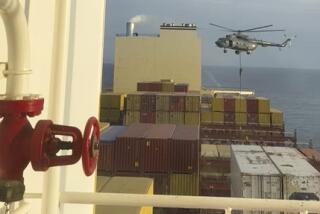Keeping the Gulf Open
- Share via
The Iran-Iraq war that began 6 1/2 years ago quickly imperiled the security of international shipping in the Persian Gulf. Almost immediately the United States explicitly committed itself to keeping the gulf open, recognizing its vital importance in the movement of oil to world markets. From the beginning, though, the United States found itself playing pretty much of a unilateral role. That role has required stationing some naval vessels in the gulf and keeping others nearby, in the north Arabian Sea. Now the U.S. burden has increased.
Iran, ever-assiduous in shopping throughout the world for new weapons, has recently obtained surface-to-surface missiles from China. These weapons, armed with 1,000-pound high-explosive warheads, have now been positioned at the 24-mile-wide Strait of Hormuz, at the mouth of the gulf. So far the missiles haven’t been used. If the Iranians do choose to use them against non-belligerent shipping, there is a real danger that the gulf could be effectively closed. It is in response to this threat that the United States has moved the carrier Kitty Hawk and its battle group closer to the strait. Meanwhile, a specific offer has been made to Kuwait, a major oil-exporting country at the northern end of the gulf, for U.S. naval protection of its shipping.
Half the world’s known oil reserves are located in Persian Gulf states, and millions of barrels of oil daily pass through the narrow and vulnerable Strait of Hormuz. Preventing any interference with this traffic is clearly of the greatest international concern. So far, though, only the United States has acted to respond to this concern. Yet there are other countries, particularly in Western Europe, that rely far more heavily for their oil supplies on the Persian Gulf. Moreover, the world oil market is such that a threat to supplies from any source immediately affects all oil-importing countries. The United States has done the right thing in pledging to keep the gulf open. It should not, however, be faced with meeting that commitment alone. Other maritime states with an interest in unimpeded transit through the gulf also have the means to respond. It is time that they did so.
More to Read
Sign up for Essential California
The most important California stories and recommendations in your inbox every morning.
You may occasionally receive promotional content from the Los Angeles Times.













